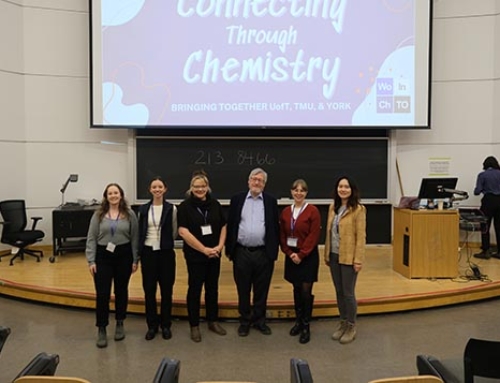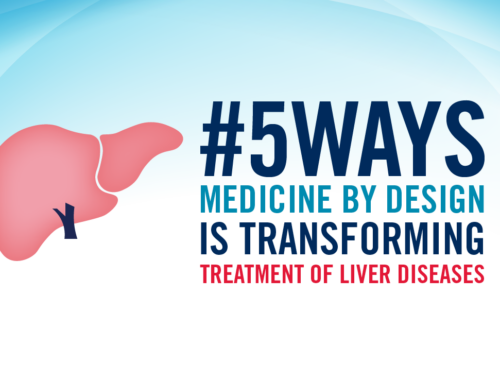
Elisa Laurenti, University of Cambridge, is part of an international team that will create a data portal to advance the study of blood stem cells. (Photo provided by Elisa Laurenti).
Through a $300,000 investment, Medicine by Design will seed two strategic projects. One project is a University of Toronto (U of T) and University Health Network (UHN) partnership with the University of Cambridge (Cambridge) to create an international data portal to advance the study of blood stem cells. And the other project brings together the unique expertise of clinicians, scientists and industry partners to examine the role of inflammation in disease.
Led by investigators at UHN and The Hospital for Sick Children (SickKids), these projects cut across multiple diseases and will have a broad impact on regenerative medicine, which seeks to harness the human body’s regenerative capacities to replace or repair damaged tissues.
“With these projects, we are enhancing our engagement with Toronto’s world-class clinical community, bolstering international partnerships with global regenerative medicine hubs like Cambridge, and accelerating our impact on human health,” says Michael Sefton, executive director of Medicine by Design.
“Seeding these projects is an investment in not only Medicine by Design’s strategic priorities, but also in the future of regenerative medicine research, as each project aims to develop new partnerships and create research tools that can be used by researchers around the world,” adds Sefton, who is also a University Professor at the Institute of Biomedical Engineering and the Department of Chemical Engineering & Applied Chemistry at the University of Toronto (U of T).
One of the projects – an international collaboration between U of T and UHN research teams and teams at Cambridge and the University of York (York) in the U.K. – aims to combine expertise and data sets, with the goal of creating a portal that will provide comprehensive information about blood stem cells in normal tissue and cancer. The Medicine by Design funding will also support trainee exchanges between labs at U of T and Cambridge with the goal of laying the groundwork for a larger PhD exchange program between the two institutions.
One of the lead investigators on the project John Dick, a senior scientist at the Princess Margaret Cancer Center, UHN, says researchers will be able to use the portal to answer critical research questions leading to improved stem cell therapies and pre-cancer intervention.
“Delivering our data into a portal for the broader community to mine at will is an enormous contribution to the stem cell and regenerative medicine community,” Dick says. “The Medicine by Design funding has allowed us to bring this group together and, by harnessing our respective data into a single portal, will enable a single uniform bioinformatics analysis.”
Elisa Laurenti, Group Leader and Wellcome Royal Society Henry Dale Fellow, Wellcome MRC Cambridge Stem Cell Institute and Department of Haematology, Cambridge, is also part of the international team, and says that the funding provides researchers with a unique opportunity.
“We will be able to extract new information from existing resources, increasing sharing and reproducibility. Linking molecular data to actual behaviours of healthy stem cells, pre-cancerous and cancer cells will provide a new framework in which to understand disease progression and enable preventative medicine approaches,” Laurenti says.
The international team has the unique expertise required to take the data generated by the investigators in the group and combine it with single-cell functional characterization data, which show how cells function at the individual level, says Dick, who also leads a Medicine by Design team project.
The special project emerged from a Medicine by Design-sponsored workshop last October that brought investigators from UHN and U of T together with U.K.-based investigators from Cambridge and York, to build on their five-year collaborative history, which includes publications in Nature in July 2018 and July 2017.
Other Toronto-based investigators working on this project are Mathieu Lupien and Daniel De Carvalho (UHN); and Gary Bader and Philip Awadalla (U of T). The other U.K.-based investigators are Brian Huntly, Bertie Göttgens, Tony Green and George Vassiliou (Cambridge); and David Kent (York).
Medicine by Design will be the lead sponsor of this project, enabling the launch of this initiative through $150,000 in seed funding.
A second strategic project, The Toronto Tissue Integrity Forum, brings together clinicians, scientists and industry in a unique partnership that aligns with a key aim of regenerative medicine: to prevent disease before it starts by using a stem cell lens to identify critical interactions or defects that prepare the ground for disease.
The forum will examine the role of the complement system – a part of the immune system that can promote inflammation and destroy tissue integrity – in a wide range of acute and chronic diseases affecting patients of all ages, using kidney disease and acute central nervous system injury as examples.
Inflammation underpins tissue dysregulation and is a growing area of interest for regenerative medicine researchers, including several of Medicine by Design’s research teams. This project reflects the need to elucidate aspects of inflammation, such as complement activation or inhibition, to inform the development of new opportunities to therapeutically target the underlying disease progression.
The forum will allow researchers to establish new lab tools and further develop existing ones for translational research, or research that moves basic science into clinical practice rapidly, says Dr. Christoph Licht, a nephrologist and senior scientist at SickKids and director of the forum. “It will also have the potential for immediate clinical application since specific, efficient and safe complement blockers are already available to treat patients.”
Licht adds, “Without exaggeration, the advent of complement inhibitors marks a paradigm shift in medicine similar to the introduction of antibiotics.”
Building on the pioneering work of the Licht lab at SickKids, the forum will establish a new platform that will serve as a molecular immunology hub that enables translational research in different fields of biomedical research at U of T and affiliated hospitals. The forum will engage scientists pursuing fundamental research and a network of clinical users and industry partners
“Besides allowing us to enhance existing core lab tools required for translational complement research, the Medicine by Design funding will enable us to demonstrate the usefulness of complement blockers in two disease models. This project has the potential for immediate clinical application,” Licht says.
A key feature of the forum will be regular translational meetings among basic scientists, clinicians and the pharmaceutical/bioengineering industry to explore promising leads in relevant pre-clinical models.
Both strategic projects will be funded for one year, with the possibility of renewal for a second year.
About Medicine by Design
Funded by a $114-million grant from the Canada First Research Excellence Fund, Medicine by Design brings together more than 130 principal investigators at the University of Toronto and its affiliated hospitals to work at the convergence of engineering, medicine and science to advance regenerative medicine and improve health outcomes. It builds on decades of made-in-Canada excellence in regenerative medicine dating back to the discovery of stem cells in the early 1960s by Toronto researchers James Till and Dr. Ernest McCulloch.





